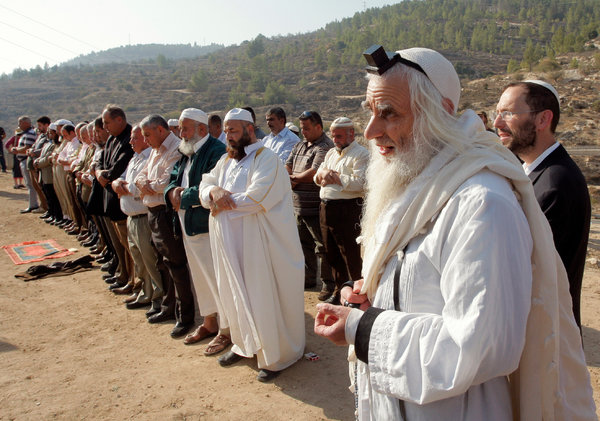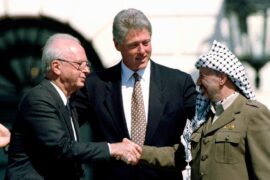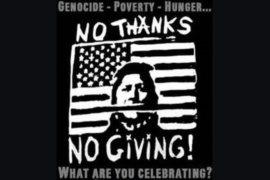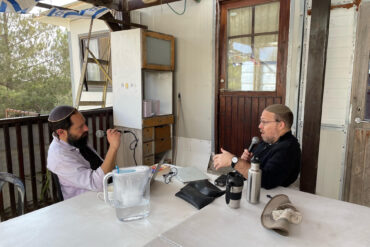The renewed fighting between Israel and the Palestinians on the eve of the Disengagement from Gaza is a bitter reminder that, despite all the tremendous efforts that we’ve made to bring peace, we have yet to fulfill the commandment in the verse, “Seek peace and pursue it” (Tehillim 34:15).
About this verse, our sages of blessed memory taught that one must seek peace in one’s place but also pursue it in another’s place. After the bloodshed that has followed the Oslo process and in the face of the current fighting in relation to the expulsion of Jews from Gaza, perhaps it’s time to seek peace in a different place?
Peace with the Other is based on respect for the Other. Actually, it’s the peace-loving Israeli leftists who quote the words of Rebbe Naḥman of Breslav – that peace is made between opposites. But what does this quote mean in regards to our issues? A “peace-pursuer” – one whose worldview is generally a Western humanistic liberal view – needs to learn with whom he so deeply wants to make peace.
The Palestinians don’t inhabit a Western world. Their spiritual world is very different. Therefore, Western cosmological premises enabled us to reach peace agreements in Oslo and Washington. But in order to reach an actual peace on the hard soil of this land – we need first to invest in “getting out of ourselves” in order to meet and respect their cultural world.
After 30 years of living amongst Palestinians, of talks and studies with Palestinians from all backgrounds (sheikhs, academics, military officials, PLO members, Hamas and more), I want to focus here on one core aspect: Relationship to land.
The connection between the Palestinians and the land is very different from the journalist who lives on the fifth floor of a Tel Aviv apartment building (to offer an example of this cultural gap, Jonathan Basse spoke in an interview about an Israeli journalist who said that he doesn’t understand the problem with the Jews being expelled from Gush Katif – because he himself just moved apartments without any issues).
In order to explain my understanding of the Palestinian connection to their soil I would bring the Torah’s phrase “because man is a tree of the field” (D’varim 20:19). And really, we can bring an even more basic cultural fact: The word Adam (man) is surely tied to the word Adama (earth) – “And G-d formed the man, dust from the earth.” (B’reishit 2:7)
A person who defines himself as existentially tied to land, could be described as “primitive.” You could also claim that a person in such a “sumud” connection to their earth, is not a free person (as a tree doesn’t easily move from place to place). But if we want to think about how to make peace with a person like this, we must first know and respect his self-definition.
From here I draw my conclusion about how critical for peace, are those Israelis who also live a connection between man and earth (adam and adama). Even more explicitly: The Mitnaḥlim – those Jews living the West Bank, connected to our homeland and history, could be the bridge of peace between the Israeli and Palestinian peoples.
In a more poetic way, which I’ve been repeating for years: The Jewish communities of the West Bank could become the fingers of the Israeli hand, outstretched for peace, because the word “fingers” holds an association of touch and sensitivity.
Of course I know from experience how my line of thought (which seems completely logical to me) is seen in the eyes of most people as completely insane. But what can I do? Could I ignore the experience of many years of my life, where actually a primitive “Judean” like myself created connections, understandings and agreements with Palestinian leadership – including Ahmed Yassin and Yasser Arafat – and it was because I was a primitive Mitnaḥel.
Where is the border between craziness and solutions to this problem to which the classic thinking has been unable to solve? The standard line of consecutive Israeli governments (accepted by most of the population) favors as much separation between the peoples as possible (the same government that’s evacuating Gaza is also building the Separation Barrier in the West Bank).
Is it so crazy to challenge the dominant paradigm? For example: Is it possible to actually separate the two peoples living in this land? What about Jerusalem? Does the economic logic of the land lead to separation? Is there not here a missing an opportunity – which I think is an incredible one – to use this epic historical moment to build here an example to the rest of the world? A co-existence between the cultural clash of the West and Islam?
And a question that touches on blood and soul: Does the spirit of separation calm the jealousies, the hate, the terror – or perhaps it just awakens them? What can we learn from our blood-soaked attempts? Can we still deny the need to build mutual respect, to build partnerships? Can a temporary blocking of the ties between the peoples serve as dealing with the roots of such a deep and painful problem? Is there any substitute for peace?
For years I’ve experienced failures to explain myself – perhaps the majority of the time. That’s why I’m trying a new way: In my eyes, “rule” is a masculine quality and “land” is feminine. For many years already I’ve felt that the most positive trends in the Jewish spirit, alongside the spirit of humanity, has been the transition from masculine values to feminine values. Therefore, the movement from the principle of “conquering the land” to the principle of “loving the land” is a transition we must make in order to advance the faith of Israel.





